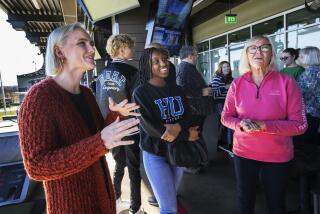Cord Meyer Jr.; CIA Spymaster Ran Covert Operations in Cold War
- Share via
WASHINGTON — Cord Meyer Jr., a figure central to many of the Central Intelligence Agency’s covert operations during the Cold War, including the secret funding of student, labor and literary groups, has died.
Suffering from a variety of ailments, including lymphoma, Meyer died Tuesday in Washington. He was 80.
Meyer, who was with the CIA from 1951 to 1977, joined as a prominent young liberal who was active in the world government movement. He advanced to become the top deputy in a section of the agency called the “dirty tricks department” by detractors because of its elaborate activities aimed at curbing Communist influence.
He gained notoriety in 1967 when it was revealed in the magazine Ramparts that, at his direction, the CIA had been subsidizing groups such as the National Student Assn. and the literary journal Encounter.
In a 1978 interview, Meyer said of the controversy, which was investigated by a presidential panel, that “the object was not to subvert students, of course, but to make it possible for the American point of view to be represented.” At the time, Soviet operatives were having success recruiting student organizers around the world.
Meyer again made headlines in 1972, when it was revealed that he had asked an old friend from the world government movement, who was then in the publishing business, to allow the CIA to review the galley proofs of a book that criticized the agency’s dealings with the drug traffic in Southeast Asia.
The instances offered rare glimpses into the internal mechanics of a shadowy agency that was coming under increasing scrutiny by critics of its tactics. In both cases, Meyer said he had not run afoul of the law and had the nation’s security interests at heart.
Meyer and his twin brother Quentin were born in Washington. The family later settled in New York City, where Meyer enjoyed a youth of privilege. He attended St. Paul’s preparatory school in New Hampshire and Yale University. He graduated a semester early in 1942, with bachelor’s degrees in English and philosophy, so that he could join the Marine Corps.
He fought in the Pacific and was badly wounded by a Japanese grenade during a landing on Guam in 1944. He lost an eye as a result of the wound. He later learned that his twin had been killed in the fighting on Okinawa.
In war dispatches that were published in the Atlantic Monthly and in a 1946 autobiography titled “Waves of Darkness,” Meyer articulated an ideology colored by his war experiences.
The book won the O. Henry Prize in 1946 for the best first-published story.
After the war, he served as an aide to Harold Stassen, the United States delegate at the drafting in San Francisco of the United Nations Charter. Meyer then became active in the world government movement.
Meyer, who was considered a rising star in liberal circles, stunned some of his fellow activists when he joined the CIA in 1951.
Meyer’s official title from 1967 to 1973 was assistant deputy director of plans, a post in which he worked with legendary spymaster Thomas Karamessines, also known as “The Greek.” Among Meyer’s duties was the CIA’s management of Radio Free Europe and Radio Liberty.
He was honored by the CIA as a “trailblazer” in 1997, when the agency celebrated its 50th anniversary. He was awarded three Distinguished Intelligence Medals during his career.
After retiring, Meyer published several books, including a memoir titled “Facing Reality: From World Federalism to the CIA.”
Meyer is survived by his wife, Starke, two sons from his first marriage, a stepson, a stepdaughter, a brother and a grandson.
More to Read
Sign up for our Book Club newsletter
Get the latest news, events and more from the Los Angeles Times Book Club, and help us get L.A. reading and talking.
You may occasionally receive promotional content from the Los Angeles Times.









